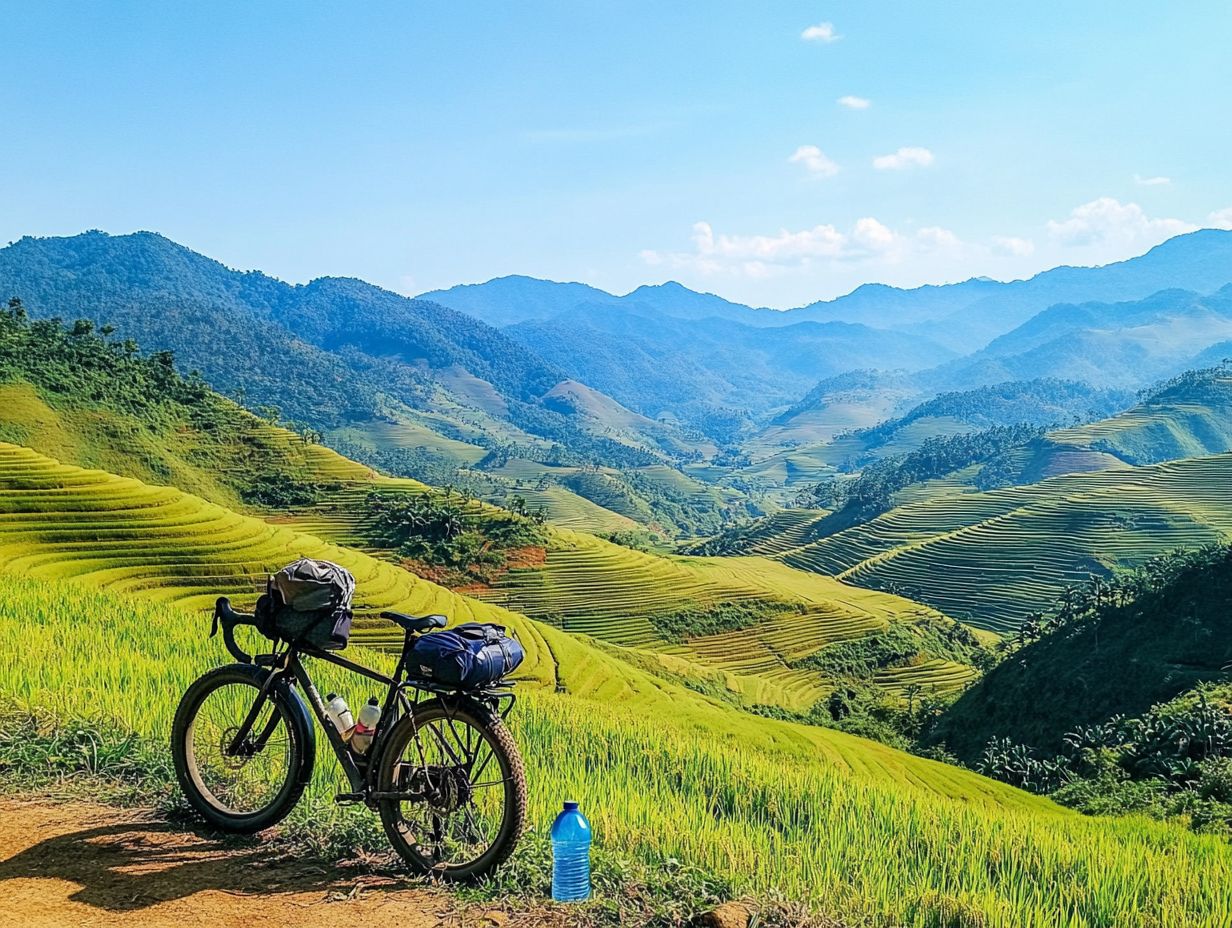7 Tips for Sustainable Travel in Asia
Traveling presents a remarkable opportunity to immerse yourself in diverse cultures, breathtaking landscapes, and unforgettable experiences. However, it’s essential to reflect on your impact on the planet and the communities you encounter while engaging in sustainable travel.
This article provides you with seven practical tips for sustainable travel in Asia. It guides you on everything from selecting eco-friendly accommodations to supporting local enterprises.
Uncover how to reduce your carbon footprint while indulging in enriching experiences that honor local customs. Embrace the journey of making travel more mindful and advantageous for the cherished destinations you explore, ensuring plastic waste reduction.
Contents
- Key Takeaways:
- 1. Choose Eco-Friendly Accommodations
- 2. Use Public Transportation or Walk
- 3. Support Local Businesses
- 4. Reduce Plastic Waste
- 5. Respect the Local Culture and Customs
- 6. Conserve Energy and Water
- 7. Participate in Sustainable Activities
- What Is Sustainable Travel and Why Is It Important?
- What Are the Environmental Impacts of Unsustainable Travel?
- How Can Travelers Minimize Their Carbon Footprint?
- What Are Some Sustainable Travel Options in Asia?
- How Can Travelers Support Sustainable Tourism in Asia?
- What Are the Challenges of Sustainable Travel in Asia?
- How Can Sustainable Travel Benefit Local Communities?
- Frequently Asked Questions
- What are the top 7 tips for sustainable travel in Asia?
- How can I find eco-friendly accommodation in Asia?
- Why is using local transportation important for sustainable travel in Asia?
- What are some ways to reduce plastic usage while traveling in Asia?
- How can I support local businesses while traveling in Asia?
- What are some sustainable activities and tours I can participate in while traveling in Asia?
Key Takeaways:

- Stay in eco-lodges or green hotels to keep the environment happy.
- Use public transportation or walk to reduce your carbon footprint.
- Support local businesses by buying locally-made products and dining at locally-owned restaurants.
1. Choose Eco-Friendly Accommodations
Choosing eco-friendly accommodations is an important step for sustainable travel, especially in vibrant regions like Japan and Southeast Asia, where tourism is thriving. By opting for environmentally conscious lodgings, you can reduce plastic waste and support the local economy through community engagement.
To identify such places, look for certifications like Green Key or EarthCheck, which highlight a property s dedication to sustainability. In Japan, you might find eco-lodges nestled in the mountains that offer a unique cultural experience while promoting wildlife conservation.
Southeast Asia also has sustainable resorts that prioritize local materials and cultural immersion. Staying in these accommodations ensures a smaller carbon footprint and enhances your travel experience, allowing you to connect more deeply with local traditions and conservation efforts in Asia.
2. Use Public Transportation or Walk
Public transportation and walking are great ways to embrace sustainable travel. With the JR nationwide pass, you gain convenient access to an extensive train network that promotes eco-friendly travel options, minimizing your reliance on plastic waste-producing alternatives.
This comprehensive rail system helps reduce your carbon footprint and invites you to immerse yourself in the local culture. Explore vibrant neighborhoods and savor regional specialties along the way.
In Southeast Asia, destinations like Thailand, Vietnam, and Indonesia offer buses, boats, and tuk-tuks that enable you to navigate bustling cities and tranquil landscapes while forming connections with locals.
These choices encourage you to delve deeper into the sociocultural fabric of the region, fostering a mindful travel experience that prioritizes environmental responsibility and authentic connections over traditional tourism.
3. Support Local Businesses
Supporting local businesses is essential for sustainable travel. It enriches your experience with authentic local cuisine and builds connections in the community, while promoting animal welfare initiatives in the area.
Engaging in food tours offers you the chance to savor the rich flavors of local cuisine. You will discover the unique ingredients and cooking methods that define regions like Southeast Asia or Japan.
Imagine yourself in Thailand, embarking on a street food tour and sampling delightful offerings from family-run stalls that have been passed down through generations.
Visiting artisan shops lets you pick up unique souvenirs while helping to preserve traditional arts and sustain local livelihoods. By choosing businesses that embrace sustainable practices like eco-friendly accommodations such as Keemala or Puri Dajuma you significantly reduce your environmental footprint. Plus, you ensure that your travel contributes positively to the local community.
4. Reduce Plastic Waste
Reducing plastic waste is vital for sustainable travel. Incorporating items like a reusable shopping bag and a water bottle into your journey can significantly bolster zero waste efforts.
This small shift promotes an environmentally conscious approach during your adventures. Choosing biodegradable toiletries and bringing your own utensils further lessens reliance on single-use plastics.
You can amplify your impact by seeking out local businesses that prioritize sustainability and support eco-friendly practices. Participating in community-driven initiatives, like beach clean-ups in stunning places such as Thailand and Indonesia, helps preserve the natural beauty of these areas.
These efforts cultivate a sense of responsibility among fellow travelers. By sharing tips and raising awareness about plastic waste with your peers, you inspire more individuals to adopt sustainable practices and protect our planet.
5. Respect the Local Culture and Customs

Respecting local culture and customs is crucial for sustainable travel. It enables you to engage meaningfully with communities in Japan and Southeast Asia.
Your actions should reflect an understanding of cultural norms, ensuring respectful interactions. For example, in Japan, removing your shoes before entering someone s home or specific traditional establishments is a practice steeped in respect and cleanliness.
Similarly, understanding the significance of greetings like the traditional ‘wai’ in Thailand can lead to deeper connections.
When you embrace these customs, you not only enhance your travel experience but also reduce the chances of misunderstandings or unintentional offenses. Embracing these customs creates a warm, welcoming connection.
By acknowledging and respecting these unique cultural practices, you can leave a positive impact, enriching both your journey and the communities you explore.
6. Conserve Energy and Water
Conserving energy and water is absolutely essential for sustainable travel. It directly impacts places like Khao Yai National Park and Angkor Wat.
These practices protect natural resources and minimize the environmental footprint of tourism, which is vital for sustainable holidays. As a traveler, it s crucial to be mindful of your impact, even when staying in eco-friendly accommodations.
By adopting simple habits, like taking shorter showers and turning off lights when you leave a room, you contribute significantly to conservation efforts.
Supporting locations with green certifications is another practical step. Many hotels in Japan embrace eco-friendly practices, including energy-efficient lighting and water-saving fixtures, all while ensuring your comfort.
In Southeast Asia, resorts often integrate rainwater harvesting systems and solar panels, reflecting a strong commitment to sustainability. As you embrace these eco-conscious behaviors, you not only enrich your travel experience but also play a vital role in preserving the environment for future generations.
7. Participate in Sustainable Activities
Participating in sustainable activities during your travels enriches your experience. It also allows you to positively impact the local community and wildlife.
By volunteering with local NGOs, you can support important initiatives like reforestation projects and wildlife rehabilitation efforts. For example, the Gibbon Project helps protect these amazing creatures. Imagine how rewarding it feels to know your efforts are making a difference!
Eco-tours that prioritize animal welfare offer unique insights into the natural world. They also ensure conservation practices are upheld.
Consider a trip to Southeast Asia to visit the Gibbon Project. You’ll gain knowledge about preserving these incredible creatures and their habitats. Participating in community events, like local festivals or clean-up drives, allows you to interact with residents and share in cultural experiences.
These experiences leave a lasting positive impact that resonates long after your journey ends.
What Is Sustainable Travel and Why Is It Important?
Sustainable travel embraces a mindful approach to exploring the world. It prioritizes the environment, respects local cultures, and encourages community involvement.
This approach is vital. It helps mitigate the negative environmental impacts of tourism while promoting responsible practices.
Supporting small businesses and preserving cultural heritage leads to a more equitable travel experience. Choosing eco-friendly accommodations and engaging in authentic local experiences reduces your carbon footprint.
For example, opting for locally guided tours allows you to gain a richer understanding of the area while ensuring that your tourism dollars benefit the community.
Making thoughtful choices elevates your travel experience and contributes to the long-term viability of destinations. You help cultivate a more sustainable future for both the planet and its diverse cultures.
What Are the Environmental Impacts of Unsustainable Travel?
Unsustainable travel practices carry significant environmental consequences. They include a surge in plastic waste, harm to wildlife, and the degradation of natural habitats. It s essential to adopt methods that prioritize sustainability and animal welfare.
The rise of mass tourism has led to startling statistics. For instance, global air travel is estimated to contribute about 2.5% of total greenhouse gas emissions. In some popular destinations, reports document an astonishing 80% decline in biodiversity due to infrastructure designed for visitors.
When you venture into sensitive ecosystems without regard for their fragility, local flora and fauna suffer dire consequences. Take Bali, where coral reefs have been damaged by snorkelers trampling and littering.
This pressing situation highlights the importance of embracing eco-friendly practices. Protect our planet and the cultures you engage with during your journeys!
How Can Travelers Minimize Their Carbon Footprint?

You can effectively minimize your carbon footprint by embracing sustainable travel tips, such as using public transportation, opting for eco-friendly accommodations, and enjoying local or plant-based cuisine when dining out.
Alongside these practices, consider participating in carbon offset programs programs that help balance the carbon emissions you produce during your travels. Choosing direct flights whenever possible is another savvy move, as it reduces the carbon footprint associated with layovers and lengthy detours.
Engaging in responsible tourism activities, such as supporting local artisans and businesses, lets you make a real difference for both the community and the environment. To enhance your efforts, consider how to plan a sustainable travel itinerary. Packing light not only simplifies your travel experience but also cuts down on fuel consumption, whether you’re flying or driving.
Being mindful of your water usage and waste generation throughout your journey amplifies your commitment to sustainability, ultimately contributing to a healthier planet.
What Are Some Sustainable Travel Options in Asia?
Asia presents you with an abundance of sustainable travel options, from eco-friendly accommodations in Japan to responsible wildlife tours throughout Southeast Asia. These experiences allow you to align your values with your adventures while respecting the unique local environments. Explore places like Angkor Wat, which emphasizes cultural heritage and community involvement.
In Japan, imagine staying in a ryokan that sources its ingredients locally and champions traditional farming practices. You can also immerse yourself in community-led cultural workshops that support local artisans, enriching your journey even further.
Over in Thailand, you ll find eco-conscious resorts hidden within lush jungles, where you can participate in tree-planting activities or visit organic farms, truly engaging with the natural world around you.
Vietnam offers guided bike tours through its rural landscapes that support local communities and help reduce carbon footprints. These opportunities not only elevate your travel experience but also leave a positive impact on the destinations you visit.
How Can Travelers Support Sustainable Tourism in Asia?
You can support sustainable tourism in Asia by engaging with local businesses, participating in community initiatives, and advocating for animal welfare all while enhancing your travel experiences.
When you choose to dine at locally owned eateries instead of large chains, you not only savor authentic flavors but also contribute to the vitality of the regional economy. Joining community workshops, whether it s learning traditional crafts or taking cooking classes, allows you to forge meaningful connections with locals and deepen your appreciation for their cultural heritage.
Being mindful of your travel choices, such as opting for eco-friendly transportation or reducing plastic use, promotes responsible tourism and underscores your commitment to sustainability.
By immersing yourself in the local culture and making thoughtful decisions, you re not just enriching your own journey but also paving the way for a more sustainable future.
Ready to explore these options? Consider what sustainable choice you will make on your next adventure!
What Are the Challenges of Sustainable Travel in Asia?
Despite the growing awareness of sustainable travel, Asia faces many challenges. These include not enough funds or materials, the environmental impacts of mass tourism, and the pressing need for greater community involvement to cultivate responsible practices.
As travelers like you discover the region’s breathtaking landscapes and rich cultural heritage, the existing infrastructure often struggles to keep up. This leads to overcrowding and stress on local ecosystems.
Unfortunately, many areas lack a solid understanding of sustainable tourism principles. This makes it difficult for both you and local businesses to adopt environmentally friendly practices.
Striking a balance between tourism revenue and the preservation of natural habitats is no easy feat. This complex situation highlights an urgent need for innovative solutions that prioritize economic benefits while maintaining ecological integrity.
How Can Sustainable Travel Benefit Local Communities?
Sustainable travel creates a powerful impact for local communities, driving economic growth, enhancing cultural preservation, and encouraging community engagement. This fosters a mutually beneficial relationship between you, the traveler, and the locals.
This approach provides a steady stream of income for small businesses and enables local artisans and craftspeople to showcase their unique skills to a wider audience.
As you engage with these communities, you help cultivate a deeper appreciation for local traditions and practices, which can inspire a stronger commitment to preserving cultural heritage.
By participating in workshops or cultural events, you allow residents to share their stories and customs with you, enriching your travel experience while ensuring that these cherished traditions are passed down through generations.
Ultimately, this creates a vibrant environment where both you and the locals benefit from meaningful interactions.
Frequently Asked Questions

What are the top 7 tips for sustainable travel in Asia?
- Choose eco-friendly accommodation
- Use local transportation
- Respect local customs and traditions
- Reduce plastic usage
- Support local businesses
- Stay in one place for a longer period
- Participate in sustainable activities and tours
How can I find eco-friendly accommodation in Asia?
You can find eco-friendly accommodation in Asia by searching for certified eco-lodges, using websites that promote sustainable travel, and reading reviews from other eco-conscious travelers.
Why is using local transportation important for sustainable travel in Asia?
Using local transportation in Asia helps reduce carbon emissions and supports the local economy. It also allows you to immerse yourself in the culture and experience the destination like a local.
What are some ways to reduce plastic usage while traveling in Asia?
Some ways to reduce plastic usage while traveling in Asia include bringing a reusable water bottle, avoiding single-use plastic containers, and saying no to plastic bags. You can also support businesses that offer alternatives to plastic products.
How can I support local businesses while traveling in Asia?
You can support local businesses in Asia by choosing to eat at locally owned restaurants, purchasing souvenirs from local artisans, and booking tours and activities with locally owned companies.
What are some sustainable activities and tours I can participate in while traveling in Asia?
Some sustainable activities and tours you can participate in while traveling in Asia include visiting local markets, taking cooking classes using locally sourced ingredients, and volunteering with environmental conservation projects.
Join the movement for sustainable travel today!






